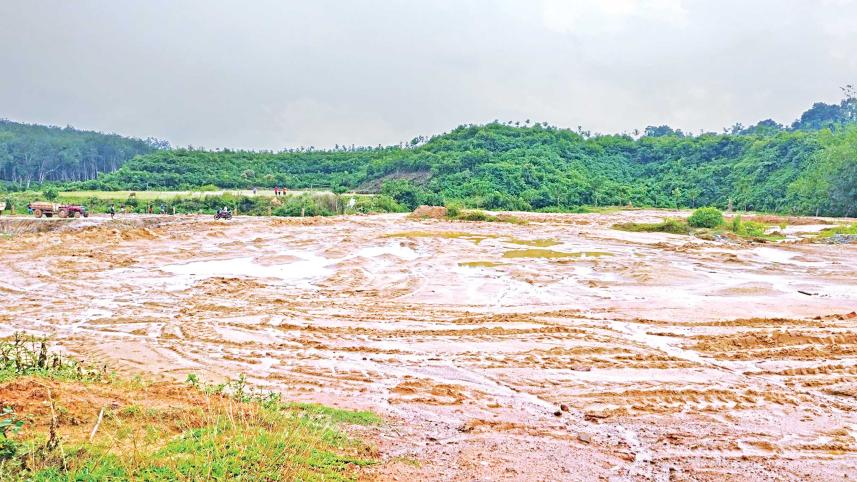Once there were hills

We desperately need the hills to ensure the survival of our wildlife and conserve biodiversity.
Once, Rupaichhara government hills in Habiganj used to be around 500 feet high. Due to sand extraction and tree felling, they now stand on the verge of extinction.
This correspondent recently visited Rupaichhara Rubber Garden in Bahubal upazila and found two hills on the west and the north already cut, along with the trees. Around 19 acres of rubber plantation were gone as well.
Locals alleged that an influential quarter has been behind the illegal hill cutting and sand extraction -- backed up by a ruling party leader.
Meanwhile, the Department of Environment officials and local administration are silent observers when it comes to hill cutting, alleged locals.
According to Rupaichhara Rubber Garden authorities, the total area of the garden is 1,963 acres. There are 17 government-owned rubber plantations in the country, four of which are located in Sylhet division. One of them is Habiganj's Rupaichhara.
Talking to the rubber-garden authorities and locals, it was known that Putijuri Union Parishad's former chair and Habiganj District Tanti League's president Md Muddat Ali has occupied about 19 acres of the garden's lands, and claimed three more acres.
Besides, few other sand traders are continuing illegal sand extraction from the Soshanchhara stream flowing through the garden.
Saddam Hossain, a resident of the rubber-garden slum, said the garden and hills are unprotected as there's no boundary wall, and this situation makes them a target for those looking to extract sand and cut trees.
"The authorities never took any action," he alleged.
"Hills are being cut every night. An eight-bigha playground, a 10-acre rubber garden nursery on the east side of the field, and a 12-foot wide road have been destroyed to cater to Muddat Ali's land business," alleged Sadek Mia, a resident of Kalyanpur village.
However, when this correspondent contacted Muddat Ali, he denied the allegations and said sand has been extracted from his privately-owned land. When asked whether privately-owned hills can be cut under the Sand and Land Management Act, he said, "I have the approval of the Ministry of Mineral Resources to extract sand."
Shah Shaheda Akther, Sylhet divisional coordinator of Bangladesh Environmental Lawyers Association (Bela), said as per the Environment Conservation (Amendment) Act 2010, hill cutting is a cognisable offence and no government, semi-government, or autonomous organisation is allowed to cut or raze hills without prior permission from the authorities concerned.
The penalty for cutting hills without approval is up to two years imprisonment, a fine of Tk 2 lakh, or both, for a first offence. For a subsequent offence, the penalty is up to ten years of rigorous imprisonment or a fine of Tk 10 lakh or both.
"Astonishingly, the government proposes to increase forest land to 20 percent of the country's total land by 2030, while every year, government hills are being cut with the help of government officials," said Tofazzal Sohel, general secretary of Bangladesh Poribesh Andolon's Habiganj chapter.
"We desperately need the hills to ensure the survival of our wildlife and conserve biodiversity," he added.
Abdul Baki, Rupaichhara Rubber Garden's manager, acknowledged that the garden is indeed unprotected without a boundary wall.
"Muddat Ali told us that he was extracting sand from his own lands. We will investigate and take necessary steps regarding the issue," said the garden manager.




 For all latest news, follow The Daily Star's Google News channel.
For all latest news, follow The Daily Star's Google News channel.
Comments